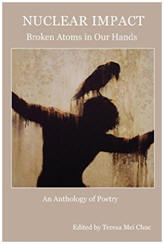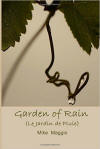
|
Nuclear Impact
Summer before last, observances of the 70th anniversary of the bombing of Hiroshima and Nagasaki brought back memories from early childhood, and I wrote a little poem. I never expected to show it to anyone, much less submit for publication. But Shabda Press announced it was compiling a poetry anthology on the impact of nuclear power, and my poem was accepted.
|
 |
||
Victory Garden
On the 70th anniversary of the bombing
of Hiroshima and Nagasaki
Daddy worked all day in town, then
took up hoe and spade to plant
a harvest worth of groceries
in our victory garden
I didn’t know what victory meant
why the window shades were black
why we didn’t have enough gas
to take a ride in the old Ford
or why Mother called it black market
when Mr. Orndorf drove in from the farm
bringing butter, eggs, and milk
in his battered pickup truck
We kids played Bombs Over Japan,
dropped rocks in the sand box, laughed
as grains exploded outwards, tiny
sprays of destruction
We didn’t know what devastation
would be sown, what toxic terror
the world would reap
from our victory
....................................................................................................................................
Why Poetry?
What’s the point of publishing poetry books when most sell a thousand at best? “The issue is larger than the number of collections of poetry sold each year,” says Daniel Halpern, himself a poet and the founder of Ecco Press. “It’s about the language—our language. Is it, too, [like an endangered species] endangered? If the depleted language of emails and texts and Twitter is any indication, then there’s a case to be made that it might be.”
Writing in the New York Times online Critic's Take, Halpern notes how common it is for people to turn to poetry for important rites of passage. Why? He suggests that the language of poetry both avoids the quotidian but simultaneously celebrates it. As poet W. S. Merwin once said, “Poetry addresses individuals in their most intimate, private, frightened and elated moments . . . because it comes closer than any other art form to addressing what cannot be said. In expressing the inexpressible, poetry remains close to the origins of language.”
Halpern quotes Emily Dickinson and other poets on the question and concludes: “Those of us who engage in the publication and sustenance of the written word do so to insure that language for our future generations remains intact, powerful and ultimately renewed, capable of its role during times of crisis and celebration.”
....................................................................................................................................
You Are Here
Welcome to
But Does it Rhyme?
We're a small, but
hopefully growing, band of poets who like to
talk about our craft and share what we've
written. We'll highlight favorite poets, review
new books, and explore the process of writing
poetry from inspiration to conclusion. (We might
venture into essays and short fiction, too.) We
hope you'll like our blog — and contribute your
own thought and poems.
Sally Zakariya, Poetry Editor
Richer Resources Publications
Charan Sue Wollard
(LivermoreLit)
Kevin Taylor
(Poet-ch'i)
Sherry Weaver Smith
(SherrysKnowledgeQuest)
INVITE US TO YOUR INBOX!
Would you like to receive our monthly newsletter? Sign up here.
| ARCHIVES |
|
Welcome to the Garden Garden of Rain, that is, the new collection of poems by Mike Maggio, a luminary in the Poetry Society of Virginia. Reviewers describe Maggio’s voice in these poems as “both refreshing and deeply disturbing” and call the collection “an existential quest” and “a wry voyage in which the sublime, like disaster, is always ahead and behind.” Here’s a poem from the book, one of Mike’s favorites: |
 |
||
The Master Fitter’s Apprentice
by Mike Maggio
My master fitter
I’ve seen your mannequins and pins, the way
a chestnut-stained fabric gently drapes your rigid
arm as you bend and crouch and. kneel. Here
in this enchanted room, filled with wicked possibilities,
I’ve watched you measure and cut, envied the soft cloth
passing through your firm fingers, coveted the barren form’s frigid
habit to welcome your tenuous touch. From this dark bitter
corner, where I gaze and await your command, I’ve furtively followed
the trace of your ring, now sparkling, now dull, a curious truce
between your secret eyes, resting briefly on my brazen shoulder,
and your heavy brow waxed by days and years of wonder and woe.
But for your bobbins, your buttons and lace
as wondrous as a Spanish galleon lost
underwater, crammed with gold and silver, muslin and aged tapestry
I would ask: what of the smile that once graced your face
the golden threads that wove the hushed yearnings bound beyond your distant eyes.
My master fitter, I will bring you bolts of cotton and silk, spools
of dappled velvet and sheer black satin. I will lay rolls of organza at your feet.
I will unfold the soft chiffon on your table and joyfully smooth it out for you
to render the silver stitches, the restive embroidery
that conceals your ruthless charm.
Look, my master: the moonlight, it stains your naked arm.
I feel a tremble rise up through your silken skin, and I fear
the wedding pleats are slowly ungathering
Mike writes prose as well. His novella The Appointment is due out in May from Vine Leaves Press.
....................................................................................................................................
Where Do Poems Come From?
Poets have their own individual answers to that question, and one intriguing explanation comes from the Russian poet Osip Mandelstam. For a course I’m taking in Russian poets, I’ve been reading
Hope Against Hope, a riveting memoir by Mandelstam’s widow, Nadezhda Mandelstam. Many poets, including her husband, she writes, have said “a poem begins with a musical phrase, ringing insistently in the ears; at first inchoate, it later takes on a precise form, though still without words.”
The words do come, of course, but Mandelstam and
his fellow poet
Anna Akhmatova apparently saw writing poetry as something like composing a melody. In fact, Nadezhda Mandelstam recounts, “M. never talked of ‘writing’ verse, only of ‘composing’ it and then copying it out.”
The results, I’ve discovered, are stunning.
....................................................................................................................................
Readings: A Confession
I hate to read my poems to other people. At least, to people I don’t know. You’d think that at my advanced age, I’d have gotten over the reticence that kept me from making all those no doubt trenchant comments in college seminars. Oh, I gain a lot from workshopping poems with a friend or a small group, but reading to an audience? Not so much.
The other day I attended a terrific event organized by Mike Maggio for the Poetry Society of Virginia. Dubbed a Poet Exchange, the afternoon featured: Henry Hart, a professor of English and Humanities at William and Mary, and Bill Glose, a journalist and former paratrooper. Their writing could hardly be more different, but both have distinctive and compelling poetic voices.
Hart read from his four books of poetry, including Familiar Ghosts, which chronicles his family’s lives here and abroad. I was mesmerized by Hart’s haunting metaphors, such as this passage from “Lost in the Gobi Desert”:
Above blackened hills, stars inched
on their ancient routes. They looked as lost as us,
holding up little lights to find the way,
their maps and compasses useless in the dark.
Next up was Glose, who read powerful poems about his experiences in the Gulf War. He recited an amazing piece about the dire mathematics of soldiering, which rocketed from the simple math of 1 + 1 = 2 to the hundreds of thousands killed, maimed, and maddened by our recent wars. It left me on the verge of tears.
And then it was time for open mic.
Talk about hard acts to follow. Why on earth had I put my name on the list? When my turn came (mercifully I wasn’t first), my voice deceived me, grating and whispering by turn. I just managed to get through a couple of pieces from “When You Escape,” my forthcoming
chapbook
from
Five Oaks Press.
So why do I sign up to read at open mics? Because poetry is, above all, an aural art – an art that communicates as much by sound as by meaning. I don’t expect anyone to rush out and buy my books, but I nurture the small hope that someday, someone will hear a line or two and think, “Could be there’s something to this poetry stuff after all.”
.....................................................................................................................................
Maybe I was making too much of a simple fried potato, but when my husband started stacking french fries, I got to thinking. The result appeared earlier this summer in The Magnolia Review:
Meditation on a French Fry .....................................................................................................................................
Message in a Bottle
Sometimes when I
submit poems for
possible
publication, it
seems like
casting a
message in a
bottle into the
sea, to be
tossed by waves,
washed up on a
deserted beach,
and ignored.
Luckily, the
bottle
occasionally
reaches a kindly
editor who likes
what’s inside.
One of my poems
found a home in
the Summer 2016
issue of
Little Patuxent
Review,
a handsome print
journal now
celebrating its
tenth
anniversary.
Here’s the
piece:
Between the Words
So instead I write you
....................................................................................................................................
One Poem or More?
Should you submit more than one poem to a journal? What if you’re not sure all the poems you could send are equally strong? In a blog post titled “Submitting Etiquette: How Many Poems Should You Really Send?” One poor poem in a batch of five won't lead an editor to reject them all just because that one was poor. Even four poor poems in a batch of five does nothing to take the gleam away from a decent poem of publishable quality. I'd suggest always sending as many poems as allowable per the publication’s guidelines. – Devin McGuire, Unorean Poetry Broadsheet Even if the poet believes one of the poems in a submission not to be his/her strongest, I think it is doing the poet a disservice to submit any less than what the publication is listing as the maximum number of poems per submission. A submission is a mini portfolio. – David Svenson, The New Poet Editors ask for more than one piece because they want a sense of the poet's range and aesthetic. This is difficult to determine from one piece. Plus, sending multiple pieces actually increases the likelihood the editor/publisher will find something he or she likes. – Ralph Pennel, Midway Journal
....................................................................................................................................
You’re saving the crispy ones
stacking them log-wise
kindling in a fireplace
a fire to light your way
you tell me
It takes more than that
I think, having lost my way
somewhere between the yes
of wanting and the no
of hesitation
Angled across the stack
a perfect fry glistens oil and salt
its skin left on to prove provenance
to guarantee an origin in the ground
which is where we begin and end
grubby, humble, having dreamed
our lives away, somnambulists
between first wakening
and final sleep

By Sally Zakariya
Nature has the last word,
always does, so when I send
you a message in a bottle,
the sea scrubs the ink off
the paper, and when the bottle
washes up ashore, the sand
welcomes a long-lost
brother, somehow evolved
into glass without the hell
of the furnace
And when I sing a song
for you in my old voice,
cracked and off key,
a blustery breeze
blows the tune away,
and finches drown
me out with their own
avian halleluiah
chorus, praising sun
and seeds and airy
acrobatics
a poem with imaginary
spaces between each word,
spaces so deep and wide
there’s room for both of us,
and as you read, the clock
ticks slowly—so slowly
nature’s daily round will seem to last
forever
A Hundred to One
A teacher once told me you should read 100 poems for each one you write. I’m not sure about the exact ratio, but I can’t deny it’s good advice. After all, reading lots of poems by lots of poets is a great way to expand the store of image, voice, and technique you can draw on in your own work. Books and classes are obvious ways to find those poems, and so are regular emails such as the Academy of American Poets’
Poem-a-Day or Garrison Keillor’s
The Writer's Almanac.
Another, and particularly pleasurable, way is by belonging to a poetry group that meets regularly. Not only are you exposed to a wide variety of styles and topics, but you come to recognize and appreciate each writer’s particular approach. A case in point is Eric Forsbergh, a member of the Northern Virginia Poetry Salon who consistently writes nuanced, meticulously paced poems characterized by strong visual images. One of his recent poems will resonate with anyone who has watched the diminishment and death of a parent:
An Unseen Path
Supposedly I knew, due to my own mother’s death,
how to walk this scrubby path,
tilted woods, moonless field.
I could grope at air, but could not see,
the line of her departure.
I had wiped her mouth,
held her hand, a bent flightless bird,
changed her garment often
as though always getting ready for a trip.
She complied in wordless ways
Two months before,
persevering at her one garbled request,
she motioned to me to raise her to the window
to view impossibly the Irish Sea to Wales’ west.
From the cliffs, its eternity of sun-picked water
jostles, a shimmer of blue broken glass.
After she died, I had to remember
the path back in the dark,
still thinking myself alone,
as when she’d enter silently,
my child lip in quiver,
and I’d feel her unexpected weight on the bed,
not seeing her hand rise to stroke my hair.
My wife, in another state,
phones from her mother’s hospice room,
and asks if I’d describe the route.
As a kitchen toddler, her small fingers
had once memorized a hem of gingham dress.
Mixing memory, her mother now insisted
on that dress to travel in,
to a deep Tennessee forest where leaves of scripture
flock in trees beyond the rail fence.
Eric Forsbergh lives in Virginia. His collection
Imagine Morning: Poems of Companionship & Solitudea> was published in 2013 by Richer Resources Publications. Three of his poems appear in
Joys of the Table: An Anthology of Culinary Verse
RRP’s Joys of the Table: An Anthology of Culinary Verse, accompanied by two recipes.
....................................................................................................................................
Image and Imagination
The image is the raw material of poetry; it is, in the words of Ezra Pound, “that which presents an intellectual and emotional complex in an instant of time.” Don’t burden the image with abstract language, he went on to say, or dress it up with ornament. The image itself is the central element of the poem.
The ideas of Pound and other early 20th century Imagists have deeply influenced contemporary poetry – and continue to challenge novice poets today. In
Learning Image and Description, California poet Rachel Richardson presents a mini-master class on the image.
“In order to imagine,” she writes, “we begin with an image.” She goes on to suggest ways to approach constructing images, working with close observation, memory, and sensory detail. Her lesson includes background on the Imagist movement and, most helpful, close reading of images central to a number of well-known poems and the literal and figurative language that supports those images.
Lots to think about in this brief but compelling piece
.....................................................................................................................................
What Are You Writing?
Why should we get all the bylines? Submit your
latest poem—just one for now—and we’ll publish
the poems we like best in an upcoming blog post.
Simultaneous submissions are fine, but please
let us know if the poem is accepted or published
elsewhere. Send your poem, plus a few lines
about yourself, in the body of an e-mail message
to:
poetryeditor@RicherResourcesPublications.com
